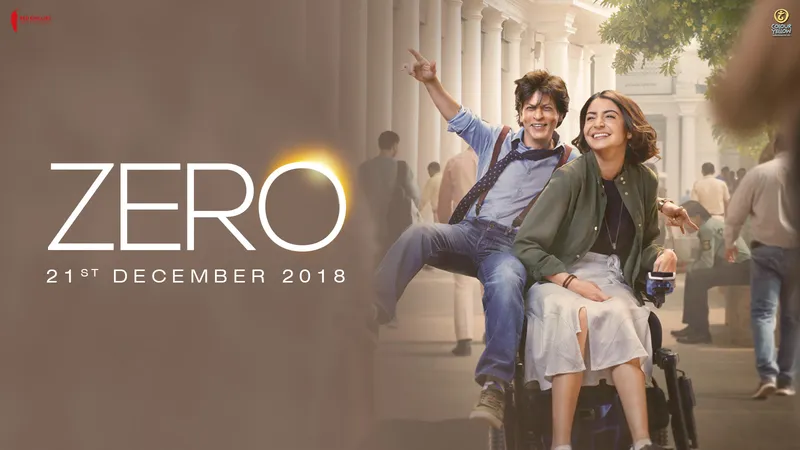Dear Bollywood, why aren't your movies accessible to the specially-abled?
To the Bollywood Industry,
I came across an article where Hrithik Roshan says, ‘One thing that has been playing on my mind is the need for our public places to be easily accessible to these people. It is a larger thought, but it is surprising that it hasn't happened yet, even with over 20 million specially-abled people in India.’ (TOI May 8, 2017).
I became emotional reading that but felt relieved at the same time. It is very significant for the Deaf and Hard of Hearing community in India. You may not realise how vital these words are to the recognition and acknowledging our very existence in this world, as Deaf individuals. For too long, we have been ignored and shunned.

On December 21, a Bollywood film Zero, featuring Shahrukh Khan, was released where the actor plays a character with dwarfism. His co-star, Anushka Sharma plays a woman with cerebral palsy and is confined to a wheelchair. This film will possibly open the public’s minds to the fact that people with disabilities experience challenges in finding love like the rest.
I am a Deaf advocate for equal rights in India. Imagine me going to watch a Bollywood cinema with everyone else. I buy popcorn and a Coca-Cola and sit in my seat. I am excited to see how the main characters support my community, people with disabilities, onscreen.
But...once I see SRK start talking, I don’t understand a word he says. For a very simple reason: there are no English subtitles for those who need access to understand the important message ‘Zero’ is aiming to spread all over India. I would have to walk out of the movie theatre without being able to get a refund for my ticket and wonder, “When will this situation ever change?”
Despite the Rights for People with Disabilities Act that states that “access must be given”, the fundamental right to see the Bollywood film ‘Zero’ is denied to members of the very community it is portraying onscreen. I contacted a national movie theatre company, PVR, to see if this movie will be shown with English subtitles. But, the sad truth is that the movie will not be released with subtitles for the Indian market.
Isn’t it ironic how Bollywood wishes to make the community inclusive by bringing PWDs to mainstream cinema and yet fails to reach the very people it is portraying by not providing access?
I decided to create a bilingual (written English and Indian Sign Language) survey to be sent to the public in India. Within two weeks, I received about 4,000 responses from individuals who are both deaf and non-deaf.
84 percent of the respondents stated they ‘do agree that production houses should provide subtitles with movies for better accessibility for the Deaf and Hard of Hearing community’. I asked, “How do you think subtitles benefit the hearing community?’ A majority of respondents stated ‘increase understanding of dialogues, enhance vocabulary, and improve reading skills.’
My question to all of you is, “How much longer do you want us to fight for the fundamental right to just be able to go to the movies without any barriers?” What more evidence would it take for the majority of us to realise that this is a source of constant discrimination?
This is a chronic issue that needs to be fixed. The Rights of Persons with Disability (RPWD) Act was passed in 2016. It is now December 2018 and yet, nothing much has happened to resolve this issue.
The Law states:
- under Chapter 1, 2(h) defines “discrimination” in relation to disability, means any distinction, exclusion, restriction on the basis of disability which is the purpose or effect of impairing or nullifying the recognition, enjoyment or exercise on an equal basis with others of all human rights and fundamental freedoms in the political, economic, social, cultural, civil or any other field and includes all forms of discrimination and denial of reasonable accommodation;
- under Chapter 5, 29 (g) mentions that the appropriate government shall take measures to promote...developing technology, assistive devices and equipment to facilitate access and inclusion for persons with disabilities in recreational activities;
- under Chapter 8, Section 42 (ii) of the Act states that ‘persons with disabilities have access to electronic media by providing audio description, sign language interpretation, and closed captioning.’
Where is the accountability on following what was promised?
I would like to refer to what Hrithik Roshan stated in an article that was published in May 2017,’…won’t have to think twice before stepping out for something as small as watching a movie. I’d love to help if there is anything I can do for that.’
Well, I am here to advocate along with you and others to turn the goal of everyone being able to go to a movie theatre into reality. I know that with your support and influence, we can start a revolution in accessibility. Are you ready?
Also read: This deaf social entrepreneur from the US is creating a big bang in India







